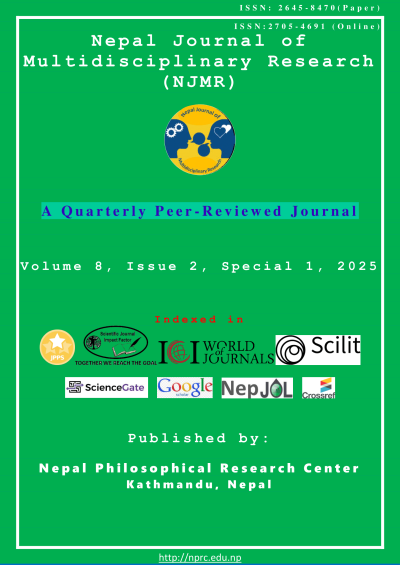Determining Factors Affecting Career Coaching and Counseling Among Undergraduates: The Mediating Role of Career Decision Self-Efficacy
DOI:
https://doi.org/10.3126/njmr.v8i2.77590Keywords:
Career Coach, Career Counseling, Human Resource Management, Capacity DevelopmentAbstract
Abstract
Background: Career coaching and counseling are vital tools for undergraduates to effectively identify career decisions in today's competitive labor market. However, the utilization of these services remains an area of study, as it is influenced by various career determinant factors such as institutional support, socio-cultural factors, awareness, and motivation. The main objective of this research was to analyze the mediating role of Career Decision Self-Efficacy (CDSE) in the relationship between determining factors and the utilization of career counseling services.
Methods:The explanatory research design using structural equation modeling was used. Three hundred undergraduates were taken as sample from three universities were surveyed using validated Likert-scale questionnaires. Constructs measured included institutional support, socio-cultural influences, awareness, motivation, CDSE, and service utilization.
Results:The findings revealed that the determinants of coaching and counseling, namely institutional support, socio-cultural influences, awareness, and motivation, were positively correlated with CDSE, while CDSE was strongly correlated with service utilization. The mediation analysis indicates that CDSE partially mediates the relationship between external determinants and service utilization, accounting for 42.56% of the variance explained using the VAF method.
Conclusion:This study concludes that enhancing CDSE significantly improves students' engagement with career counseling services. Interventions targeting institutional support, awareness campaigns, and confidence-building strategies can optimize service utilization among undergraduates.
Novelty:By focusing on CDSE as a pivotal mediator, this study offers novel insights into improving career development programs at universities to enhance proactive career behavior among students. This will bridge external factors and career counseling utilization, offering actionable recommendations for academic institutions aimed at cultivating proactive career behaviors among students.
Keywords: Career coaching and counseling, institutional support, socio-cultural support, utilization, SEM
Downloads
Downloads
Published
How to Cite
Issue
Section
License
Copyright (c) 2025 The Author(s)

This work is licensed under a Creative Commons Attribution-NonCommercial 4.0 International License.
This license enables reusers to distribute, remix, adapt, and build upon the material in any medium or format for noncommercial purposes only, and only so long as attribution is given to the creator.




